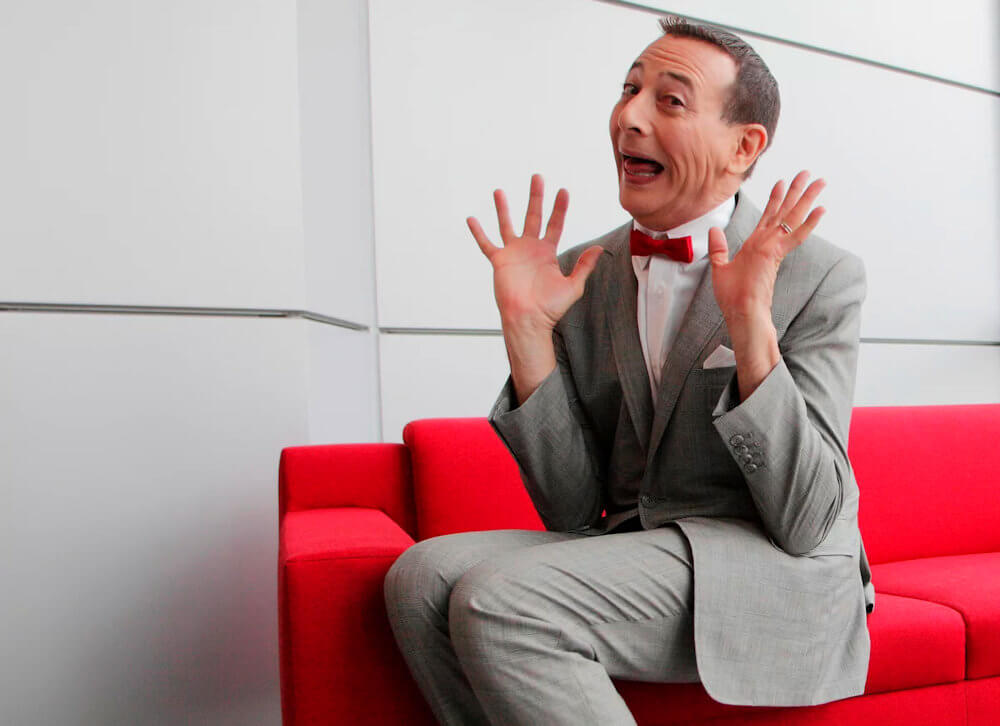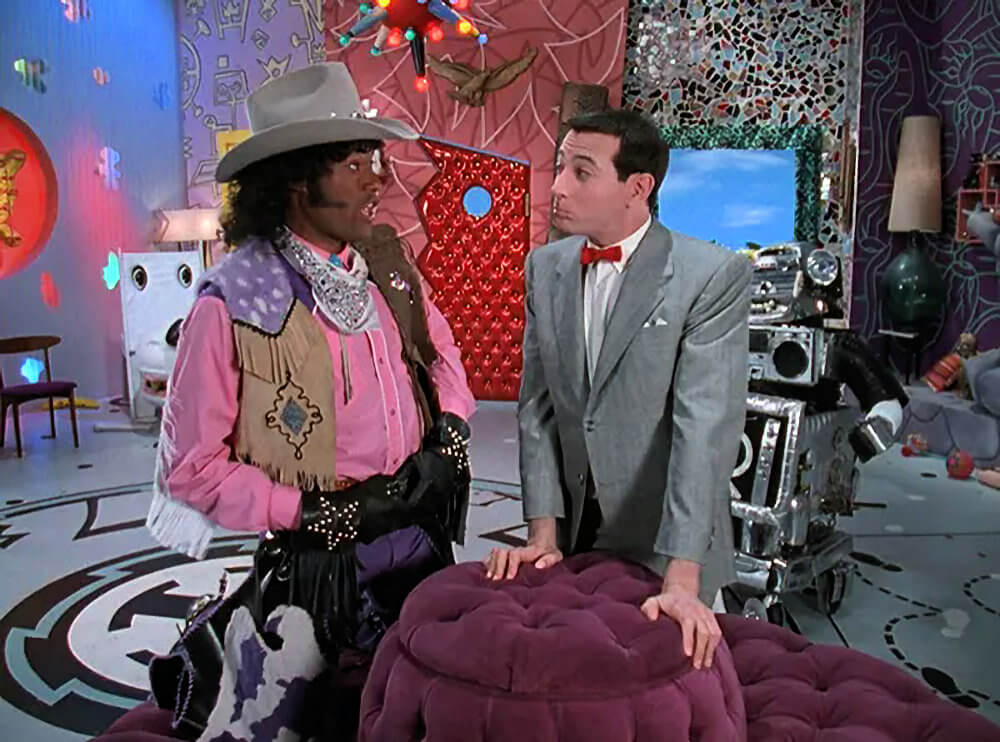Key Takeaways
- Pee-wee Herman's character became an unexpected LGBTQ+ icon through his celebration of difference and joy
- The show's subversive elements and queer-coded content resonated with LGBTQ+ viewers
- Paul Reubens' personal journey reflects the challenges of being different in mainstream media
- The legacy of Pee-wee Herman continues to inspire self-acceptance and celebration of uniqueness
Why Pee-wee Herman Meant So Much to LGBTQ+ Fans
For a lot of us growing up, Saturday mornings were a little brighter thanks to a gray suit, a red bow tie, and a laugh that made no sense, but somehow made everything feel better. That was Pee‑wee Herman.
At first glance, Pee‑wee was silly. He rode a bike like a kid, talked to furniture, and danced like no one was watching (even when everyone was). But behind the bright colors and funny voices was something bigger, something a little more brave (Breznican, 2023).

Pee‑wee’s Playhouse wasn’t just a kids’ show. It was a whole world built for people who felt different. It told us: it’s okay to be weird. It’s okay to be loud, soft, playful, offbeat, even confusing. It’s okay to be you.
And that message, softly delivered between jokes and talking chairs, meant a lot—especially to LGBTQ+ kids and adults who didn’t always feel safe or seen elsewhere (Cochrane, 2023). Pee‑wee never had to say he was gay or queer. He just was… joyfully different. For many, that was enough to feel part of something (PinkNews Staff, 2023).
Now, with the new HBO documentary Pee‑wee as Himself, we’re finally seeing more of the man behind the bow tie, Paul Reubens, and how much of himself he put into that playful, outsider world. As we celebrate Pride Month, this feels like the perfect moment to reflect on what Pee‑wee gave us, what Paul Reubens carried in silence, and why this goofy, giggling loner meant so much to so many.
Let’s talk about it.
How Pee-wee's Playhouse Became a Queer TV Landmark
In the 1980s, most kids’ shows followed a formula: teach a lesson, show a cartoon, and wrap it up with a tidy moral. But Pee‑wee’s Playhouse didn’t follow the rules, because Pee‑wee never did (Breznican, 2023).
Pee‑wee’s world was loud, colorful, and full of life. Chairs talked, dinosaurs lived in the wall, and anything could happen when you said the secret word. It was fun and chaotic, but there was something deeper, too—a playground for kids who felt different. It welcomed every kid who didn’t quite fit the mold (McKinney, 2024).

While other shows taught you how to “be good,” Pee‑wee’s Playhouse quietly taught you it was okay to be weird. The mail lady was strong and loud, Cowboy Curtis (played by a very sparkly‑pajamaed Laurence Fishburne) shared the screen with a genie who felt like a fabulous drag queen, and shirtless lifeguards hung out with glam puppets in a beatnik band (Cochrane, 2023).
It wasn’t overtly political—that’s part of what made it so powerful. The queerness of the Playhouse was woven into the show’s DNA, its joyful oddness, flamboyant energy, and chosen‑family vibe. One critic called it “a queer fantasia of camp, kitsch, and kindness” (Entertainment Weekly, as cited in Breznican, 2023).
Remember the context: late‑’80s America was conservative on gender and sexuality. LGBTQ+ characters were rare and often tragic. Yet here was a wildly popular children’s show centering joy, eccentricity, and family that looked nothing like the norm. Pee‑wee simply existed—breaking rules with love—and that was revolutionary (Siede, 2023).
For many queer kids (and grown‑ups), it was the first time anything on TV felt like home—even if they didn’t have the words for it yet (PinkNews Staff, 2023).
Pee-wee Herman's Queer-Coded Persona Explained
Even if Pee‑wee never said he was gay, everything about him seemed to whisper it, with a wink, a giggle, and a generous helping of glitter.
Paul Reubens never labeled Pee‑wee. The character wasn’t straight, gay, or even romantic. He was something different: a sweet, playful man‑child who danced through life without the usual rules (Breznican, 2023). For many queer viewers, that was exactly the point.
Pee‑wee didn’t need to declare an identity—his very existence challenged expectations. He wore makeup, had dainty mannerisms, showed no interest in traditional romance, and eschewed macho tropes for mischievous fun (Cochrane, 2023). As PinkNews put it, his vibe was “borderline androgynous,” with “queer undertones LGBTQ+ audiences instantly recognized—even if they couldn’t yet explain why”.
There were also sly subversions. In one episode, Pee‑wee marries a bowl of fruit salad—goofy and camp, but also a jab at the old “fruit” insult (Siede, 2023). When Reubens returned with Netflix’s Pee‑wee’s Big Holiday in 2016, the storyline with Joe Manganiello played like a whimsical gay road‑trip romance, which fans embraced as Pee‑wee’s unofficial coming‑out (Cochrane, 2023).

Pee-wee Herman's Controversies and Comeback, Explained
Paul Reubens paid a heavy price for embodying this joyous outsider. In 1991, he was arrested for indecent exposure in an adult theater. Overnight, reruns vanished and late‑night hosts turned Pee‑wee into a punchline (Lonsdorf, 2023). In 2002, he faced another media storm over a vintage erotica collection wrongly labeled illicit; charges were later dropped, but the damage was done (Yahr, 2023).
The HBO film Pee‑wee as Himself faces these chapters head‑on, framing them as part of the cost of living behind a mask (Wolf, 2025). Director Matt Wolf says the film became “less about Pee‑wee and more about the price Paul paid to keep him alive” (Wolf, 2025).
Many queer critics now view the harsh backlash as tinged with homophobia: society was quick to shame an ambiguously queer icon once his private life collided with public expectations (Cochrane, 2023).
Through it all, Reubens never stopped creating. He resurfaced in cameos and indie projects, eventually gifting fans Pee‑wee’s Big Holiday—a soft, funny, deeply queer‑coded story of friendship and love (Siede, 2023). That resilience is as much a part of Pee‑wee’s legacy as any giggle or secret word.
Pee-wee Herman's Impact on LGBTQ+ Representation Today
Pee‑wee Herman was never built to be a symbol—just a guy in a gray suit talking to chairs. But sometimes the most radical messages arrive wrapped in silliness. Tucked inside claymation dinosaurs and talking furniture, Pee‑wee’s lesson was simple:
It’s okay to be different.
That message resonated for queer viewers who rarely saw themselves celebrated onscreen. Pee‑wee’s world offered joy without judgment, otherness without apology, love without explanation.
The new documentary shows how much Paul Reubens sacrificed to create that world—keeping his personal life private because he feared honesty might cost him everything. Yet his art told the truth: joy can be resistance, play can be healing.
“I know you are, but what am I?” Pee‑wee loved to tease—turning shame into empowerment.
Today we can answer: You were magic, Paul. You were one of us. And we see you.
FAQs About Culturally Competent Therapy
Paul Reubens died on July 30, 2023, at age 70 after a private six-year battle with lung cancer and acute myelogenous leukemia, a form of blood cancer. His diagnosis was shared only after his passing.
In 1991, Reubens was arrested for indecent exposure, which led to the cancellation of Pee-wee's Playhouse and intense media backlash. In 2002, he faced false accusations over vintage erotica, with all charges eventually dropped. Critics now view both incidents as fueled in part by moral panic and homophobia.
"I know you are, but what am I?"
This iconic comeback became a pop culture catchphrase and symbolized Pee-wee's playful, defiant charm.
Reubens battled lung cancer and leukemia privately for years before passing in 2023. He kept his diagnosis secret while continuing to work and create.
Ready to Embrace Your Authentic Self?
Works Cited
- Breznican, A. (2023, August 1). Why Pee‑wee’s Playhouse still matters: A look back at TV’s most joyful oddity. Entertainment Weekly.
- Cochrane, L. (2023, August 2). Pee‑wee Herman’s irreverent utopia was always quietly queer. The Guardian.
- Entertainment Weekly. (2023, August 1). A queer fantasia of camp, kitsch, and kindness: Revisiting Pee‑wee’s Playhouse.
- Gajanan, M. (2023, July 31). Paul Reubens kept his six‑year cancer battle private. Time.
- Lonsdorf, K. (2023, August 1). Actor Paul Reubens, best known as Pee‑wee Herman, dies at 70. NPR.
- McKinney, C. (2024). Camp for kids: Queer readings of Pee‑wee’s Playhouse. Journal of Popular Television, 12(1), 42‑59.
- PinkNews Staff. (2023, August 3). How Pee‑wee Herman quietly became a queer icon. PinkNews.
- Siede, C. (2023, August 4). The radical silliness of Pee‑wee Herman. Vox.
- Wolf, M. (Director). (2025). Pee‑wee as Himself [Documentary]. HBO Documentary Films.
- Yahr, E. (2023, July 31). Paul Reubens, actor behind Pee‑wee Herman, dies after secret cancer battle. The Washington Post.




